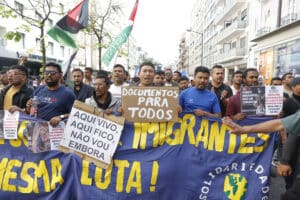José Cesário wants emigrants return to live particularly in “low-density regions, where we need people with purchasing power”
Portugal’s Secretary of State for Portuguese Communities, José Cesário, has defended that retired Portuguese citizens living abroad should get tax breaks if they decide to come back home.
In an interview with Lusa news agency, Cesário argued that pensioners living abroad should be able to take advantage of “special conditions” in tax matters when returning to Portugal, which could be achieved by adapting the existing Regressar (Return) programme designed for younger emigrants.
According to the secretary of state, these special conditions “are not defined in the law; they don’t fit into the plan of the Regressar programme” and therefore a new approach is needed in the future.
This is a matter that is unlikely to gain much traction in the next month, however, given that Portugal is just over one month away from snap legislative elections on May 18, and a new government may have a completely different opinion on the matter.
Still, he insisted that the country must come up with measures to bring these retired emigrants back to Portugal.
“We have to be sure that a national citizen who is retired by a social security organisation in another country, when he receives his pension here, can be exempt, even partially, from paying tax on that pension,” he said. “It’s a matter that has to be looked at on a case-by-case basis, taking into account the characteristics of each country.”
The secretary of state further argued: “What I would like is for us to be able to have a model in which this national citizen can come to Portugal, receive his pension here, with an advantageous tax situation that allows him to stay and live, particularly in our so-called low-density regions, where we notoriously need a population and a population with purchasing power.”
However, he recognised that whether or nor these citizens actually return is more a matter for local authorities in Portugal than national government policies.
“I know this reality very well,” he said. “I come from a region that has thousands and thousands of such cases and I discuss this constantly with the local authorities. Most of the problems have to do with the relationship with local councils, parish councils or other local organisations.
“At the same time as the government has to find mechanisms, particularly from a fiscal and social point of view, to respond to these new publics, these new hypothetical residents, the local administration, other local authorities, the economy and local economic agents also have to find a way to deal with this reality,” he stressed.
Support for retired emigrants is one of the areas that, according to Cesário, has not progressed any further due to the fall of the right-of-centre coalition government last month – triggering the dissolution of parliament and snap elections – but the same is true of the restructuring of the Teaching Portuguese Abroad (EPE) network, starting with attracting more teachers, which involves “paying them better.”
However, the secretary of state stressed, the “biggest problem” is the “inadequacy of the network, the network of courses, in relation to the current reality of the communities.
“We have courses in local communities with extremely low attendance and we have significant communities that have no response whatsoever,” he noted.
Cesário criticised other responses taken by the previous Socialist government, such as the purchase of electronic tablets “without planning their use” – a reference to the purchase of 22,000 devices, of which only around 15,000 have been delivered and of which only a portion are used, because “there are schools that don’t allow their use, there are parents who don’t allow it either and there are teachers who aren’t prepared for it.”
The measure cost €17 million that, in Cesário’s opinion, could have been used for other measures: “We could have spent that money flooding the network we have,.. rethinking the timetable network in a completely different way, [finding] support mechanisms even in terms of teaching materials for a number of schools [but] the easy option of buying computers was taken.”
As for what might make the 1,584,499 Portuguese registered voters resident abroad take part in the May 18 elections for the four members of parliament who represent emigrants, Cesário said that it will be “their love of Portugal.”
He pledged that, if he is able to take up government office again, he will fight for electronic voting and for an increase in the number of MPs to three for the ‘Europe’ constituency, from the current two, and to three for ‘Outside Europe’ – also currently with two MPs.
Source: LUSA




















